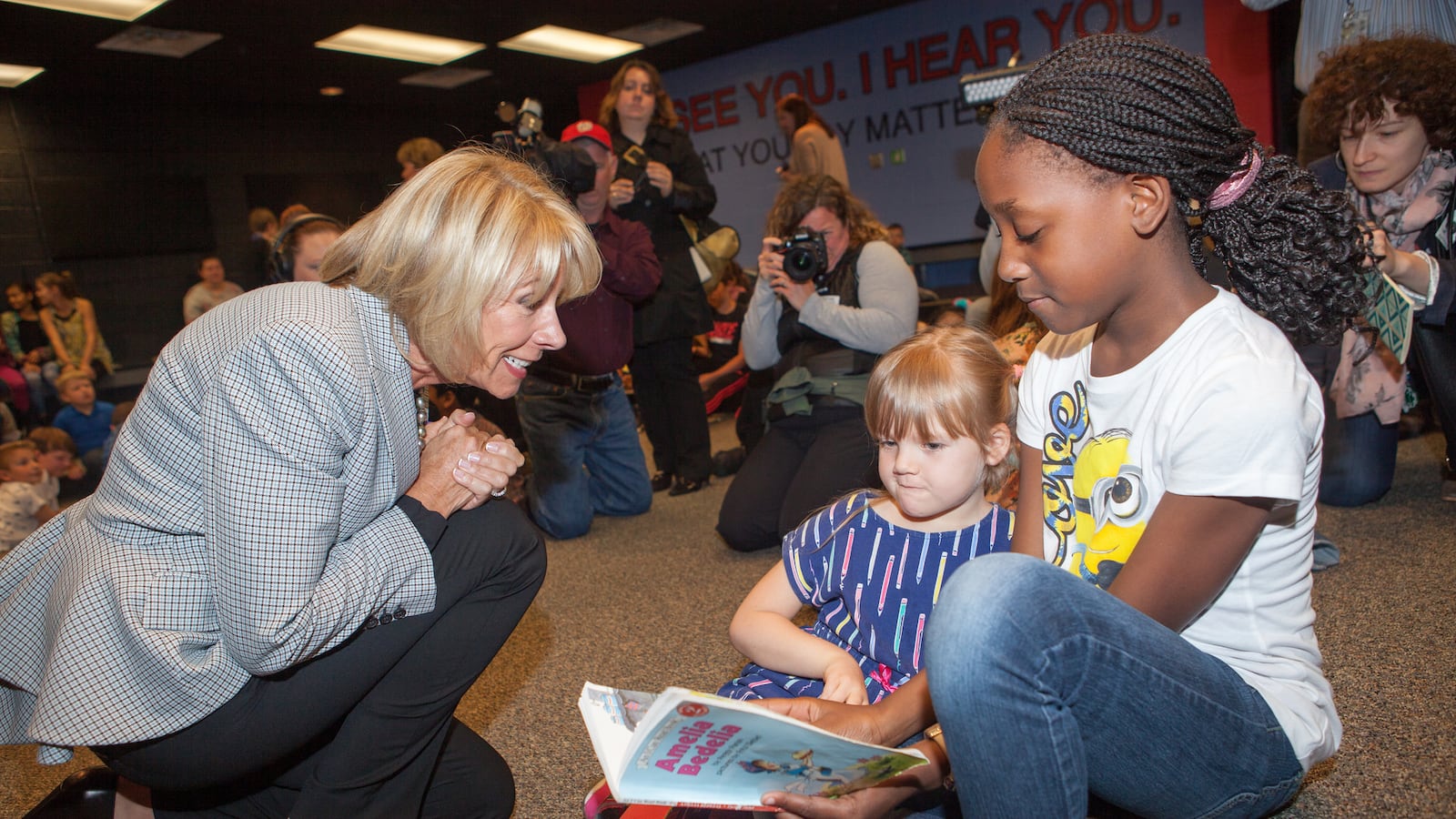According to Betsy DeVos, American education embodies that quote often attributed to Albert Einstein: “doing the same thing over and over and expecting different results.”
The U.S. education secretary kicked off her “Rethink School” tour in Casper, Wyoming, encouraging schools to be more innovative — and to help students avoid the boredom she once felt as a student.
DeVos’s speech to students at Woods Learning Center included familiar digs at “the education system” and Washington bureaucrats. It also sketched out her own vision for education in more detail than we’ve heard in a while, after a summer where DeVos made few public appearances.
That vision is all about parents having lots of options for where to send their students — and for many of those options to serve one slice of students well, rather than trying to educate students with different needs.
Here are a few key takeaways:
DeVos is convinced that school hasn’t changed in 100 years.
From today’s remarks: “For far too many kids, this year’s first day back to school looks and feels a lot like last year’s first day back to school. And the year before that. And the generation before that. And the generation before that. That means your parents’ parents’ parents. Most students are starting a new school year that is all too familiar. Desks lined up in rows. Their teacher standing in front of the room, framed by a blackboard. They dive into a curriculum written for the “average” student. They follow the same schedule, the same routine – just waiting to be saved by the bell. It’s a mundane malaise that dampens dreams, dims horizons, and denies futures.”
This claim has gotten lots of attention recently — it is an idea central to last week’s primetime “XQ Super School Live” special on innovative high schools. (XQ, the initiative behind that broadcast, even shares most of a slogan with DeVos’s effort.)
Education historians say DeVos has a point in some respects, such as how school days are structured. But in other ways, schools have changed substantially — especially in how they now see themselves as an institution for all students, not a chosen few.
Her vision comes back to school choice …
“Your school leaders recognize this and say, as it says on your website: ‘We also know that families have many reasons for choosing various schools. Some want to send kids to the school down the street, while others select schools based on proximity of daycare or work … Open enrollment gives families the opportunities to find the schools that are best for them and their children.’
School choice is the issue that brought DeVos, a longtime school voucher proponent, into the public sphere. On Tuesday, DeVos’s praise for Woods Learning Center’s district centered on its willingness to let parents choose a school for their children.
After the speech, a Woods Learning Center student asked DeVos what kind of changes she wants schools to make.
“Starting with the opportunity for every kid, every child to go to a school that is going to fit their kind of personality,” she replied.
… And personalized learning.
From today’s remarks: “Here at Woods, you know that well. Your personalized learning program rethinks school because it’s structured around you. Each of your learning plans is developed for each of you, recognizing that each of you is different, and that you learn at your own pace and in your own way. Your success here at Woods is determined by what each of you are learning and mastering. Not by how long you sit at your desks. That is awesome, by the way. If I had that opportunity when I was in school, many many many years ago, I think I would not have been nearly as bored as I was.”
This focus on personalization is why DeVos wanted to highlight Woods Learning Center, she said. It’s also a focus of her former advocacy group, the American Federation for Children.
“The end game … is personalized learning,” said Kevin Chavous, an AFC board member, said at the group’s convening in May. “We are going to get to this place where as opposed to every child being shepherded into a schoolhouse where they sit in a classroom and where a teacher stands and delivers, and then they regurgitate back … those days are not going to be the future.”
The research evidence for those blended or personalized learning models is mixed. Results are worse for fully virtual schools, which DeVos did not mention.
Watch DeVos’s full speech here:


